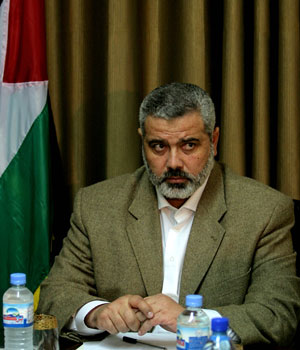
Palestinian Prime Minister Ismail Haniyeh of the Islamic group Hamas looks on while attending the first cabinet meeting in Gaza City, March 31, 2006 (AP)
GAZA CITY, Gaza Strip (AP) – Deadly factional fighting in Gaza has created a “dangerous” situation, the Palestinian prime minister said Saturday, adding that his security forces would try to get gunmen off the streets.
Prime Minister Ismail Haniyeh spoke a day after a top militant was killed in a car bomb. His killing set off exchanges of fire that killed three Palestinians, wounded 36 and raised the possibility of wider clashes.
It was the first direct threat to the new Hamas government, which was sworn in earlier this week.
The militant, Abu Yousef Abu Quka, had ties to Hamas, and his supporters accused the Preventive Security Service, dominated by loyalists of Palestinian President Mahmoud Abbas’ defeated Fatah Party, of killing Abu Quka.
Haniyeh said Saturday that top security officials were trying to end tensions, “because this is a dangerous situation and shouldn’t happen again.” The prime minister said the security forces would also try
to “pull our civilian gunmen off the streets,” but did not explain whether he was referring to all armed men who are not members of the security forces. Gaza has been plagued by lawlessness in recent months, with gunmen roaming the streets with impunity. Many have ties to Fatah.
Abu Quka was a senior commander of the Popular Resistance Committees, an umbrella group of about 200 gunmen that has been linked to explosions of Israeli tanks and a deadly attack on a U.S. diplomatic convoy in 2003.
About half the gunmen are allied with Hamas, including Abu Quka, and the other half with Fatah. Hamas took control of the Palestinian Authority on Wednesday after trouncing Fatah in legislative elections in January. It has pledged to restore order in the Gaza Strip and West Bank, but Palestinian security forces, most of them affiliated with Fatah, have been involved in some of the violence, and Hamas has little control over them.
Abbas, a moderate who favors peace talks with Israel, is a vocal critic of violence but has struggled to gain control over the security forces since his election last year. On Friday evening, Haniyeh ordered an investigation and urged calm. “I want to stress the need not to slide toward civil war,” he said in a televised interview. “Let us not direct our arrows at each other.”
Hamas’ interior minister, Said Siyam, who is in charge of several security agencies, including preventive security, promised to bring Abu Quka’s killers to justice. He also called for unity. “We regret the exchange of accusations and mentioning of names,” he said.
Abu Quka was killed Friday when his white Subaru blew up in a Gaza City street. The Popular Resistance Committees initially blamed Israel, which denied involvement, and then pointed to the Preventive Security Service. Abu Abir said gunmen loyal to Mohammed Dahlan, the former Prevent Security Service chief in Gaza and a Fatah lawmaker in the new parliament, were caught spying on Abu Quka’s home Thursday. Abu Abir said he and his allies had declared “an open war” on Dahlan and several other top security commanders.
Despite Fatah’s election loss, Dahlan remains one of the wealthiest and most powerful figures in Gaza, with hundreds of gunmen, including members of the Preventive Security Service, still loyal to him.
Dahlan, who was in the United Arab Emirates, dismissed the allegations as “baseless ugly accusations.”
Palestinian intelligence officials said Abu Quka was a known Hamas supporter, and appeared to have been targeted for his loyalties. The officials, fearing for their safety, spoke on condition of anonymity.
When Abu Abir called a news conference to discuss the killing, rival gunmen burst on the scene, sparking a shootout. Hospital officials said two boys, ages 15 and 13, were wounded, one seriously.
The violence escalated during Abu Quka’s funeral procession. Accompanying the body, hundreds of gunmen marched through the streets of Gaza City.
Gunfire broke out at the funeral. Hospital officials said three people were killed, including two bystanders and a PRC member who had joined the procession. Thirty-six others were wounded, six critically, they said. After the funeral, dozens of Fatah-linked gunmen blocked the roads leading to the home of Samir Masharawi, another strongman close to Dahlan. A spokesman for the gunmen pledged to take “all necessary measures against Abu Abir. He must be punished.”

A Palestinian holds his head in grief at the morgue near the body of Abu Yousef Abu Quka, a Popular Resistance Committees commander killed in Gaza City, March 31, 2006 (AP)

Palestinian militant leader Abu Yousef Abu Quka was killed in an air strike after Defence Minister Shaul Mofaz ordered stepped up targeted killings of top militants (AFP)
